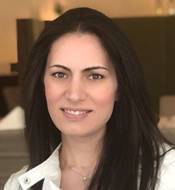People of ACM European Chapters - Pelin Angin
August 16, 2018
Can you briefly describe your own line of research and how you became interested in this area?
My main research area is security for cloud computing systems and the Internet of Things (IoT). Recently, I have started conducting research in the applications of blockchain to securing data sharing in distributed systems, as well as decentralized authentication of IoT devices in various domains. My current research particularly focuses on anomaly detection in cloud systems through big data analytics. We are working on designing and developing high-performance streaming analytics systems with integrated deep reinforcement learning modules to provide self-healing capability to cloud systems in the face of attacks and/or operation failures.
I became interested in this area of research during my PhD study at Purdue University, where I was very fortunate to be advised by Professor Bharat Bhargava, whose primary field of research is distributed systems security. Cloud systems were still at their infancy when I started my PhD in 2007, and there have been numerous attacks against different service providers since then. The ability to mitigate these attacks, as well as other failures in real time, is a necessity for all cloud systems today, as a big portion of the computation infrastructure of many companies—and even some state organizations--are cloud-based. Seeing the need and potential for new contributions in this area, I have been conducting research for the past few years.
In your area of research, what recent advance/emerging subfield will yield important advances in the years ahead?
One of the most important contributions for the advancement of the field will be provided by the availability of high computation power provided by GPUs, and more recently TPUs—which has made deep learning with high accuracy possible. I believe the recent advances in the field of machine learning and artificial intelligence will help create self-learning, autonomous cloud systems that are able to mitigate attacks and recover from operational failures in a seamless manner. Of course, another technology that will prove beneficial for cloud and IoT security research is blockchain, which has become immensely popular in the past two to three years. I believe blockchain will particularly prove useful for decentralized authentication and data integrity verification in cloud and IoT systems, even if its efficacy may be more limited than expected for some of the other anticipated application areas.
Will you tell us a little about the METU-CEng ACM Student Chapter?
The chapter currently has around 10 or 11 official members, although our activities are attended by many more. Most of the members are freshman or sophomore students. The most important activity of the chapter is preparation for international programming competitions, such as the ACM-ICPC, through weekly/biweekly programming lectures and on/off-campus competitions. The lectures are mostly given by experienced student volunteers. Other activities include visits by local software companies and gatherings with competitive programming organizations (such as Inzva) to advance knowledge in various fields of computer science and exchange ideas. We also try to hold annual programming camps on campus or in collaboration with other universities/organizations. We also attend and provide facilities for external participants to attend Google Hash Code (Google’s annual programming competition in Europe, the Middle East and Africa).
Why is being part of the METU-CEng ACM Student Chapter beneficial to members?
It’s beneficial to members because, through becoming aware of ACM early in their careers, they are able to discover what their futures in computer engineering might look like. Through membership in the chapter, students are able to improve their programming skills and become part of a community with whom they can discuss solutions to difficult programming problems. Above all, they are able to develop, early on, the analytical thinking skills they will need in their life as a computer engineer. The chapter tries to show the students the many facets of their profession-to-be, which should guide them with their future career decisions—whether they decide to stay in academia or work in industry. It also helps them socialize, which could otherwise prove difficult for engineering students with a heavy academic workload.

Pelin Angin is an Assistant Professor of Computer Engineering at Middle East Technical University (METU) in Ankara, Turkey. Her research interests include high performance mobile cloud computing, cloud computing privacy, distributed systems sensitivity and assistive technologies.
Angin received the Best Paper Award at the 6th International Workshop on Dependable Network Computing and Mobile Systems (2015) and the Best Paper Award at the 16th CERIAS Security Symposium (2015). She is the faculty advisor for the ACM Student Chapter affiliated with the university’s Computer Engineering division, which is based in Ankara (METU-CEng).